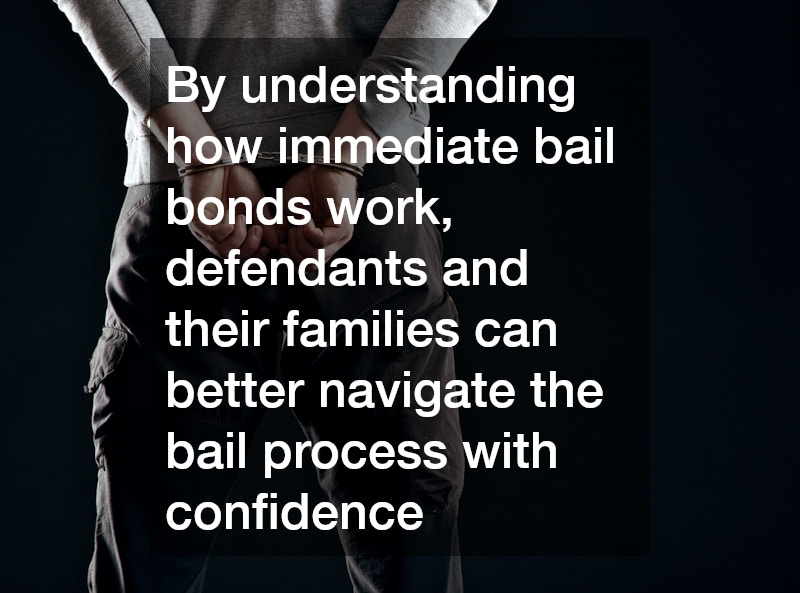When a person is arrested, the legal process can feel overwhelming and confusing. One of the first hurdles after an arrest is securing release from custody while awaiting trial. This is where an immediate bail bond becomes a valuable tool. Understanding what an immediate bail bond is and how it works can help defendants and their families navigate this challenging time more effectively. In this article, we’ll explore the basics of immediate bail bonds, how they function, and what you need to know when considering this option.
What Is a Bail Bond?
Before diving into the specifics of an immediate bail bond, it’s helpful to understand the general concept of bail bonds. When someone is arrested, a judge sets a bail amount, which acts as a financial guarantee that the defendant will appear at their scheduled court dates. Bail bonds are a way for defendants to post bail without paying the full amount upfront. Instead, they pay a percentage fee to a bail bond company, which then guarantees the full bail amount to the court. This arrangement allows the defendant to be released from custody sooner, reducing the time spent behind bars.
Defining an Immediate Bail Bond
An immediate bail bond is essentially a bail bond that is arranged and posted as quickly as possible after an arrest. It is designed to expedite the release process, allowing defendants to get out of jail with minimal delay. The need for immediacy often arises in urgent situations where waiting could mean hours or even days in custody. Bail bond agents offering immediate bail bonds work efficiently to assess the situation, collect fees, and post bail promptly.
The main advantage of an immediate bail bond is speed. Time spent in jail can be stressful and disruptive, so securing an immediate bond helps reduce this burden. Whether it’s a weekend arrest or a late-night situation, bail bond companies specializing in immediate bonds often operate 24/7 to provide quick assistance.
How Does an Immediate Bail Bond Work?
The process of obtaining an immediate bail bond begins once the defendant or their family contacts a bail bond company. The agent will typically ask for basic information such as the defendant’s name, the arresting location, and the bail amount if known. This information helps the bondsman prepare and verify the bail requirements.
Next, the bondsman will explain the fees involved, which are generally a percentage of the total bail amount, often around 10-15%. This fee is non-refundable and serves as payment for the service of posting bail. The bondsman may also discuss any collateral requirements. Depending on the amount of bail and the defendant’s background, collateral such as property or valuables might be necessary to secure the bond.
Once the fee is paid and any collateral agreed upon, the bondsman promptly posts the bail with the court. This act secures the defendant’s release, typically within a few hours, depending on court procedures. Throughout the process, the bondsman acts as a liaison between the defendant and the court system, ensuring that all legal obligations are met.
The Importance of Speed in Immediate Bail Bonds
The speed of obtaining bail is critical for several reasons. Time spent in jail can have significant personal, professional, and legal consequences. Being incarcerated, even temporarily, can affect employment, family responsibilities, and mental health. An immediate bail bond minimizes these impacts by facilitating a swift release.
Additionally, quicker release allows defendants to begin working on their legal defense outside of jail. They can meet with attorneys, gather evidence, and attend necessary appointments more easily when not confined. This can lead to better case outcomes and less disruption to daily life.
Considerations When Using an Immediate Bail Bond
While immediate bail bonds offer the benefit of speed, there are important considerations to keep in mind. The fee for posting bail through a bond company is non-refundable, regardless of the case’s outcome. This means that even if charges are dropped or the defendant is found not guilty, the fee paid for the immediate bail bond service is not returned.
Another consideration is the obligation to appear in court as scheduled. Failing to do so can result in the bail bond being revoked, leading to the defendant being re-arrested. The bail bond company may then seek to recover the full bail amount, which can have serious financial implications.
Finding a Reliable Bail Bond Company for Immediate Bail Bonds
When speed is essential, finding a trustworthy bail bond company is crucial. Look for companies that are licensed and have a good reputation in your area. Many offer 24/7 services to accommodate urgent situations. Reading reviews and seeking recommendations can help identify reliable agents.
Transparency is key. A reputable bondsman will clearly explain fees, collateral, and contract terms upfront. They should be willing to answer all questions and provide guidance through the process.
An immediate bail bond is a fast and effective way to secure release from custody after an arrest. By understanding how immediate bail bonds work, defendants and their families can better navigate the bail process with confidence. The speed and efficiency provided by these bonds help reduce the stress and disruption caused by incarceration, allowing defendants to focus on their legal defense and personal affairs.




